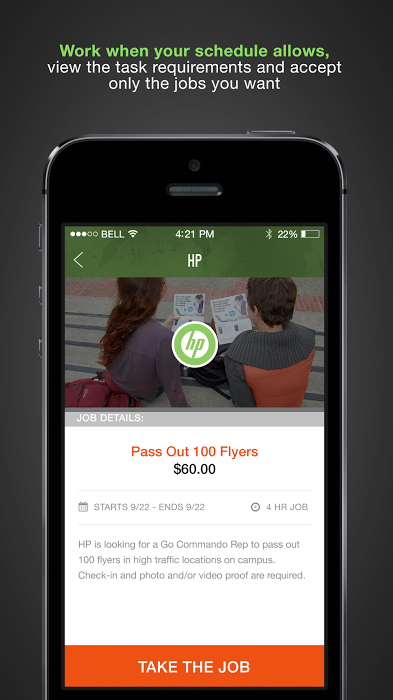Students ‘Go Commando’ for cash: App creates ways to earn money quickly
ISU students developed an app that allows other students to be rewarded for working with participating companies. There is controversy regarding students’ ability to get enough compensation.
September 17, 2014
College students know the struggle too well: Between classes, extra curricular activities and the constant need for job experience and money, students are fighting to make ends meet.
One app just may have the solution to that. By using this app, students can get paid by “going commando.”
The Go Commando app was created by Campus Commandos, which has been in business since 2010 and have been working for more than a year on their newest product.
“We’re realizing that more and more students are engaging with everything through their mobile device,” said Adam Grant, CEO and founder of Campus Commandos, “You can get a text message a lot faster than an email. Through research and development, we’ve seen that shift, so now we’re putting it on a mobile app.”
However, the term “going commando” is different for students using this app. No one is actually underwear-free.
“Go Commando allows for companies to immediately connect with college students for simple on-campus marketing tasks,” Grant said. “Our job is not only to help the brand, but also make sure students are getting a benefit out of it as well.”
College Commandos works with brands to connect its products to college students. This latest creation of the company does just that.
How it works is simple. A student using the app is sent a task to complete. The tasks can be hanging up flyers in the Memorial Union, writing a blog post or scheduling meetings with student organizations.
Students can chose to accept or reject a task at any point so it does not interfere with classwork.
“We call our students ‘commandos.’ It just kind of stuck together that you ‘Go Commando,’” said Mickey Catz, director of operations at Campus Commandos. “After we said it out loud, we laughed a little bit, but we realized it has a couple of meanings. Because it peaks interest, it works perfect for us.”
Companies, such as Hewlett Packard, DSW Inc. and L’Oreal have already signed on with Campus Commandos. Grant expects more companies to join after the app is launched.
“It’s really up to the brand on what tasks they want to post,” Grant said. “We just let them know they have to be short and simple, similar to a Twitter post.”
For each task that he or she complete, a student must document the task by snapping a picture or taking a video and sending it to the company. Once the company accepts the task as complete, the student is paid by direct deposit into his or her bank account.
Grant says that the company encourages a minimum of $10 an hour, “Which help with the unfortunate issue of student debt.”
Not only do students get paid, but they also gain job experience for resumes.
“A feature that I really like is one where we ask the brand ‘Would you work with this student again?'” Grant said. “And if they say yes, that student is issued a brand badge. So you go around with this specific brand badge on your profile, which is something that interviewers would be interested in.”
Grant and his team came up with the idea through plenty of research and some personal experience as well.
“When you’re in college, you’re independent for the first time,” Grant said. “In college, you’re identifying your brand preferences and buying habits. College is the time when brands need to reach out for students.”
David Erickson, junior in chemical engineering, is uncertain about Go Commando.
“I feel like this app sounds like you can’t spend a day working,” Erickson said. “I feel like it would be one hour of work a day or a week, so it’s not very much money. It’s committing random hours of work for no money.”
Rey Junco, associate professor in the School of Education and social media expert, is also uncertain that this app is a good investment for students. To him, it seems more like a marketing ploy.
“Its cheap labor, and on a campus where they may not have that in yet,” Junco said. “I imagine it’s for companies that doesn’t have a presence on college campuses.”
Junco is unsure whether or not students will be attracted to the app.
“I don’t know how students will react,” Junco said. “Personally, I wouldn’t want [companies] in my space that way.”
Junco agrees that with higher education costing more each year, students may look for alternative ways to pay for college.
“For $10, that’s a steal. I suspect it’ll be popular because they may not be aware of the value of what they’re doing,” Junco said. “It impedes on the freedoms of students.”
Junco said that there is a large market out there for apps that connect people and offer compensation but don’t have the product advertising aspect. One app he listed was Task Rabbit, which connects local people to help complete tasks like cleaning, repairs and other forms of assistance around the home.
Junco also listed several other apps that have become popular in the United States that connect people for services. These apps include car services, such as Uber, or people looking to rent out a spare bedroom, such as Couchsurfing.
With such a broad expanse for choices, Junco believes that Go Commando is nothing new.
“It doesn’t really seem like something people will really go wild for.”
For those students and professors who are hesitant jumping on board, Grant said that anything that makes a person stand out could be beneficial.
“It’s tough enough to stand out in college with just getting good grades,” Grant said. “So what we do is add every thing else.”
By signing up at gocommandoapp.com, students can be notified via email when Go Commando is officially launched. The app can be downloaded at the end of September through both Apple and Android stores.

















